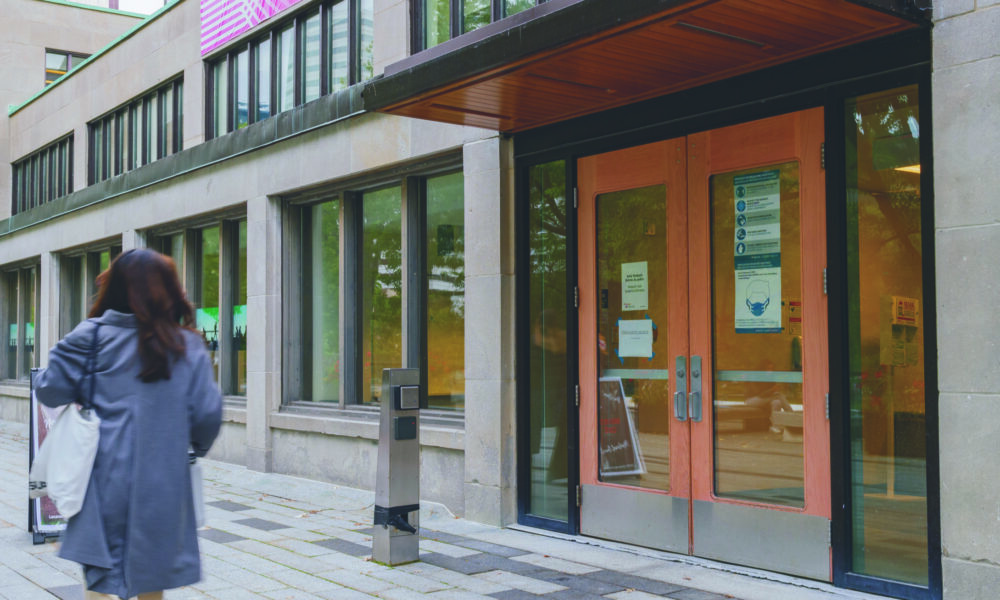McGill held a second walk-in vaccination clinic in Redpath Hall from 1 p.m. to 6 p.m. on Sept. 28 as part of its ongoing effort to make vaccines accessible to the student body. The university currently estimates 10 per cent of students have yet to be fully vaccinated against COVID-19. According to the event announcement, the clinic had the capacity to administer 250 doses—whether a first, second, or a booster shot—of the Pfizer-BioNTech vaccine during its five opening hours.
This clinic saw a lower student turnout than the university’s first vaccination clinic held on Sept. 14, when students waited in line all day and many were turned away. This time, there was no line for most of the afternoon. An hour and a half in, McGill sent a university-wide email reminding students of the clinic’s re-opening. The email stated that five public health service nurses would be accepting walk-ins until 6 p.m.
Carter Nagy, U1 Education, who arrived at the clinic early, told The McGill Tribune he anticipated a long line because of his experience at McGill’s first clinic, but was pleased to discover no line at all.
“I was here the first time they did the clinic, and that’s when I got my first shot,” Nagy said. “I came around this [same] time [for the first clinic]. It’s obviously not the same today, but I saw what it could be like so I made sure to come here early.”
Nagy got his second shot after waiting around 45 minutes, less time than the one and a half hours he waited in line at the first clinic. Nagy said that it was important for him to get vaccinated from a public health standpoint, but also because he does not want to put up with the vaccine passport restrictions in Quebec.
“My family is pretty anti-vax,” Nagy said. “But, I am here [at the clinic] because I think it is important and I want to be able to do things that I would not be able to […] do if I did not get vaccinated.”
Dr. Anne Gatignol, professor in the Department of Medicine and senior investigator at the Lady Davis Institute for Medical Research, believes on-campus vaccination clinics play a vital role given their convenience and potential for spreading knowledge on the vaccine.
“It is certainly beneficial for McGill to hold a COVID-19 vaccination clinic on campus and for students to have another place to get vaccinated,” Gatignol wrote in an email to the Tribune. “Although most Canadian students have had access to a vaccination clinic within the last few months, it may not be the case for international students. This is important for them to have […] easy access to vaccination. Furthermore, several students might still have hesitancy to get vaccinated and this is a good place to ask questions and get answers.”
Gatignol believes that McGill should keep holding clinics as long as there is demand for vaccination and suggested the university reduce clinic hours or create a sign-up system as demand wanes. She also stressed the importance of getting vaccinated amidst the spread of the Delta variant.
“The vaccination is the best way to get protected against the Delta and all variants,” Gatignol wrote. “In young people, the decrease in efficiency against the Delta variant for mRNA vaccines is no more than five per cent and it protects against all severe forms. The increasing presence of the Delta variant should encourage students and everybody even more to become vaccinated to avoid severe complications.”
Many students have already heeded McGill’s calls to get vaccinated. Ana Maria, U1 Arts, said she knew about the clinic but did not need the service because she was already vaccinated. Maria speculated the low turnout was because others were in the same position.
“I got [an] email but I did not pay attention to it,” Maria said. “I think people knew [about the clinic] but, like me, already […] got their vaccines someplace else.”
In an email to the Tribune, McGill media relations officer Frédérique Mazerolle drew attention to the importance of vaccination and emphasized McGill’s ongoing efforts to vaccinate the community.
“COVID-19 cases in the province have been on the rise, but fully vaccinated individuals are still much less likely to get COVID,” Mazerolle wrote. “By having the majority of our students, faculty, and staff vaccinated, along with properly following McGill’s health and safety guidelines, McGill will remain a safe place to learn and work.”







